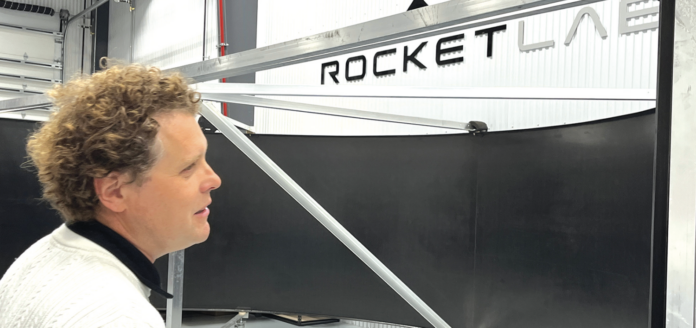BY CAROL VAUGHN, Eastern Shore Post
The number of jobs the newest private company at Wallops’ spaceport will create “is in the order of hundreds,” according to its founder.
Spin-off business related to Rocket Lab and its launches will further increase its local economic impact.
“It’s not just a launch site, it’s an entire manufacturing facility,” said founder and chief executive Peter Beck during a press conference earlier this month.
Beck is a 45-year-old entrepreneur with 32 successful Electron rocket launches under his belt from the company’s first launch site in New Zealand.
“It’s not just the Electron that we have intentions of launching here. We have the Neutron program, which is a much, much larger launch vehicle,” he said.
The company plans its first Neutron launch from Wallops in 2024.
The company is still waiting for its inaugural U.S. launch at Wallops launch after bad weather, delays finalizing government approval, and holiday airspace restrictions scrapped plans to launch in December.
Rocket Lab will announce a new launch date in January, a spokesperson said.
The company has plans to launch multiple Electron rockets from Wallops each year. The first will carry satellites into orbit for a geospatial analytics company.
Beck thanked NASA, Virginia Space, and the Federal Aviation Administration for their roles.
NASA Wallops Flight Facility Director David Pierce said “it has been nothing short of a Herculean effort” to reach the point of readiness for the inaugural Electron launch.
Pierce said Rocket Lab’s activity at Wallops “is going to have a dramatic impact on the economy of the Eastern Shore of Virginia” as well as on surrounding areas.
In addition to direct job creation, “with any one orbital launch at Wallops, you’ll see restaurants and all of the tangential businesses — hotels — really impacted in a positive way,” he said, noting the Wallops complex already has $1.4 billion per year in economic impact.
“We see nothing but that increasing,” he said.
Ted Mercer, executive director of Virginia Space, said Rocket Lab launches “will boost economic development on the Eastern Shore through launch-viewing tourism, growing the high-skilled workforce in the area, as Rocket Lab expands its operations into the region.”
Additionally, the company’s presence will draw to the region companies “that want to be involved in the supply chain for rocket launch and space lift.”
Beck and Rocket Lab communications director Morgan Bailey on Dec. 16 gave a group of journalists a tour of the launch pad on Wallops Island and the Electron Integration and Control Facility in nearby Wallops Research Park.
The Electron rocket is around 60 feet tall and nearly 4 feet in diameter.
The Neutron rocket will be 131 feet tall and around 23 feet in diameter. It is designed to be reusable and able to launch up to 14.3 tons to low-Earth orbit or more than 1.6 tons to Mars or Venus, according to Rocket Lab’s website.
Neutron is designed for mega constellation deployment, deep space missions, and human spaceflight, according to the company.
Out on Wallops Island stands Rocket Lab’s Launch Complex 2, a $20 million launch pad that was built in nine months.
A launch pad for Neutron will be built to the south of the Electron pad.
Getting his start
As a stiff wind blew and journalists snapped photos of the launch complex, with the Electron lying on its side, wrapped in protective “pajamas,” Beck talked a bit about how he got interested the rocket business.
Beck was into rocket engines as a youth — not model rockets, but larger rocket engines, which he put onto machines to see what they could do, steadily increasing their size and complexity.
“I had a rocket bike. I hold an unofficial land speed record for a rocket bike,” he said.
According to a 2016 article in the New Zealand Herald, Beck grew up in a family that loved machines.
Before founding Rocket Lab, Beck, a New Zealand native, started his career in 1993 with an apprenticeship as precision engineer at appliance manufacturer Fisher & Paykel, then moved into production machinery design, product design, and analysis.
In 2003, Beck went to a government research institute in New Zealand, where he focused on advanced composites structures and materials for high performance applications, according to a biography on Rocket Lab’s website.
At the institute, he led several complex engineering programs to optimize technologies including wind turbines and superconductors.
Since founding Rocket Lab in 2006, Beck has grown the company into a global organization that builds and launches rockets, satellites, and spacecraft.



